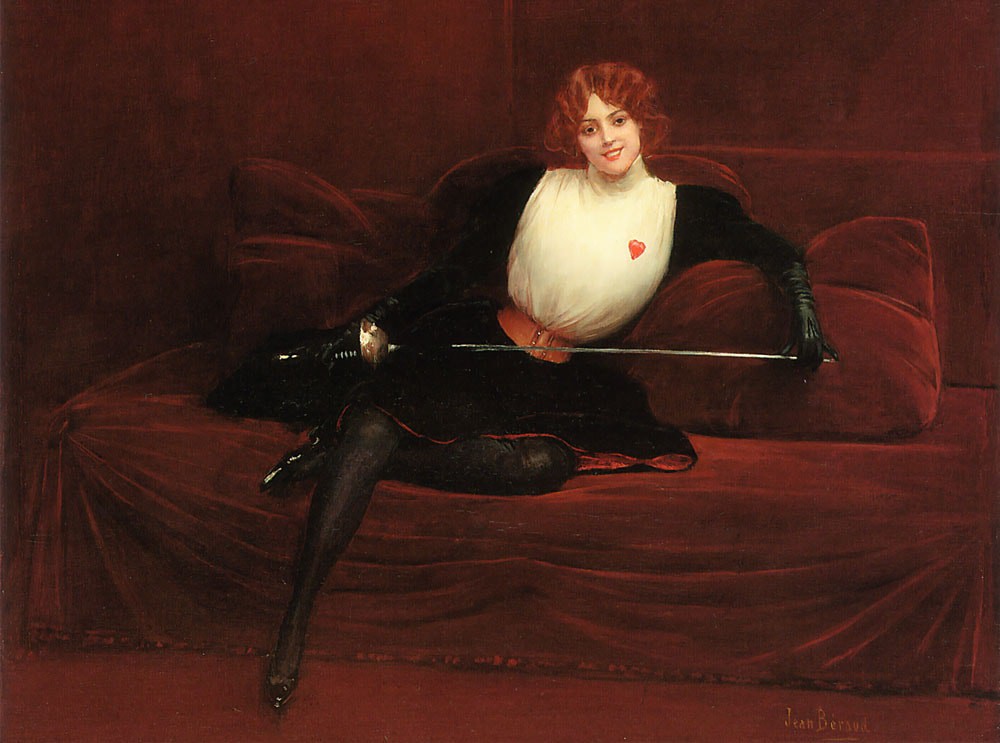No discussion of interesting fencers in history would really be complete without mentioning Julie D’Aubigny, also known as “La Maupin”. Interestingly enough, her Wikipedia entry lists her as an opera singer. After this, you may never think opera is boring again.
While most of what we know seems to be rumor and exaggerated stories, it still is an interesting read. First though, the boring stuff. Julie D’Aubigny was born in the early 1670’s to the secretary of the Master of Horse for King Louis XIV, Comte D’Armagnac. The elder D’Aubigny oversaw training the court pages, so Julie learned fencing along with them.
In 1687, the Comte D’Armagnac married her off to Sieur de Maupin, and Julie became La Maupin. Her new husband left for a position in the south of France, but La Maupin stayed behind in Paris. Also, around this time, she took up with a fencing master, who further instructed her in fencing and the use of the small sword (are you paying attention foil fencers?).
Due to some illegal dueling, Paris became too hot for these two and they fled. They earned their keep by performing fencing exhibitions and singing in taverns. Around this time, she began to dress in men’s clothing. It was reported that she was so good a fencer, the audiences frequently could not believe she was a woman!
While in Marseille, La Maupin joined an opera company and was apparently good enough to return to Paris and join the Paris Opera. This in no way put a damper on her fencing activities. She famously fought three duels in one night. This earned her a second death sentence under the law, and a second pardon from the king, who seemed to be amused by the whole scenario (the first sentence and pardon revolved around the torching of a convent, long story).
Another noted duel from that period was with the Comte D’Albert. The nature of the duel seems a bit confused. Some stories indicate that D’Albert thought he was fighting a man, others cast him as a crude, and possibly drunken, Romeo that La Maupin decided to teach a lesson. After wounding the count, she apparently felt bad and helped nurse him back to health, which resulted in a lifelong friendship apparently.
Paris once again became too hot for the boredom adverse D’Aubigny, dueling still being illegal. This time she headed to Bavaria, where she had a brief affair with the Elector of Bavaria. Eventually, she returns to Paris and the opera, where we lose track of her. The general story seems to be that she returned to her husband and lived a peaceful life until her passing at the age of 33. She sure packed a lot of life into a limited time!
Citations:
I have heard and read different stories about La Maupin over the years, but for the sake of this post, I pulled information from the following sites:
- Wikipedia (https://en.wikipedia.org/wiki/Julie_d%27Aubigny)
- Rejected Princesses (lots of good stories here) (https://www.rejectedprincesses.com/princesses/julie-daubigny)
Google Books – Curiosities of Biographies by Robert Malcom (https://books.google.com/books?hl=en&lr=&id=4W5ZAAAAcAAJ&oi=fnd&pg=PA125&dq=%22la+maupin%22&ots=EdH3sLY168&sig=XMSFwpi2mxPOaxzVYomuQApsTco#v=onepage&q&f=false)
-Jay Lefever

